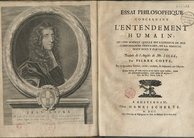|
Articles by Ryan A. Piccirillo
Found 12 articles
2011, Vol. 3 No. 08
The development of motion picture complexity has been driven by a continuing technological evolution, ignited and manipulated by human initiative and inventiveness, which has afforded filmmakers the opportunity to practice a more complex craft to... Read Article »
2010, Vol. 2 No. 10
A nine-foot-tall, royal blue giant creeps low to the ground, brushing by exotic foliage. He holds a proportionally large bow and arrow in hand. In an instant he pauses, keeping entirely still, before loading an arrow into his weapon. He pulls back... Read Article »
2010, Vol. 2 No. 10
The advent of digital computers and contemporary neuroscience has fundamentally changed possible approaches to artificial intelligence (AI). Mankind’s perpetually evolving technological capacity inevitably leads to faster processors, more... Read Article »
2010, Vol. 2 No. 09
The Holocaust created a new type of person en masse: survivors. Those who survived were forced to cope with a first-hand encounter with the human capacity for evil. For the Holocaust survivor, the struggle to live continued long after liberation... Read Article »
2010, Vol. 2 No. 09
Between 1942 and 1943, 250,000 innocent Jews were systematically murdered at the Nazi death camp Sobibor (Blatt). An underground movement, composed of a select few courageous individuals, plotted and executed a plan of escape to avoid the otherwise... Read Article »
2010, Vol. 2 No. 09
The morality of every person dictates the innate wrongness of genocide, and yet the world stood by as the Nazis sent millions to the gas chambers during the Holocaust. Historians and social scientists often attribute this moral failure to the blissfully... Read Article »
2010, Vol. 2 No. 08
From the time of the ancient Greek philosophers to modern contemporaries, the mind-body problem has been perpetually debated. With neuroscientific evidence in mind, traditional Cartesian dualism, which establishes that mental and physical substances... Read Article »
2010, Vol. 2 No. 08
For centuries philosophers have struggled to define personal identity. In his 1690 work An Essay Concering Human Understanding, John Locke proposes that one's personal identity extends only so far as their own consciousness. The connection between... Read Article »
2010, Vol. 2 No. 03
The holocaust proved that morality is adaptable in extreme circumstances. Traditional morality ceased to be so within the barbed wire of the concentration camps. Within the camps, prisoners were not treated like humans and therefore adapted... Read Article »
2010, Vol. 2 No. 03
Twentieth Century Fox was right to question the likelihood of box-office success for James Cameron’s $200 million film Titanic: “an Edwardian period piece, a costume film, a romance, a story whose ending was known – and a &lsquo... Read Article »
2010, Vol. 2 No. 03
Democracy is based on the core principle that the power to govern should be in the hands of the people. In the United States, the people exercise that power by casting their vote for the candidate they see as most fit to lead. This right is... Read Article »
2010, Vol. 2 No. 03
The scene is set for another take: the actors and extras are in costume and in place; the set decorator has set the stage just as the vision of the film entails; the director of photography has the lights and cameras ready to capture the action.... Read Article »
Expedited Article Review
Submit an article and get a decision fast.
If you need a fast decision, INQUIRIES Journal offers expedited processing of your submission for a small fee. Depending on the expedited review option you choose, you can receive a decision in as few as 5-days.
In addition to a shorter review period, the fee supports the journal's continued operation and open-access publishing model. Standard submissions are always free. Submit Now » - Submit an Article to Inquiries Journal -
|









